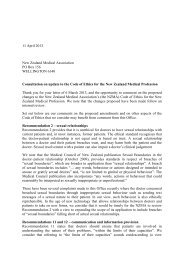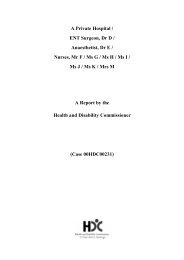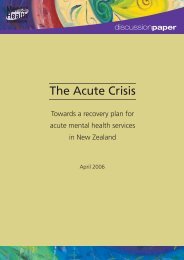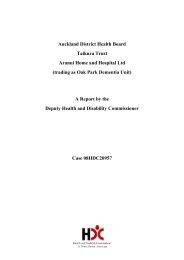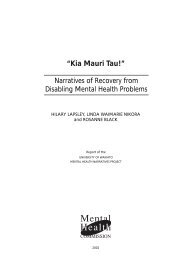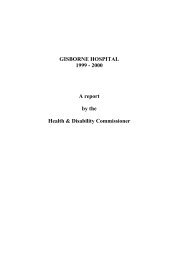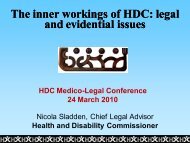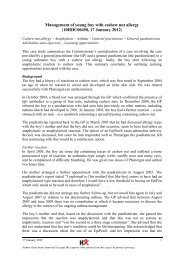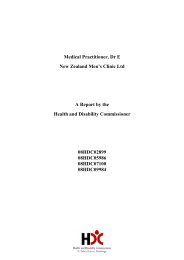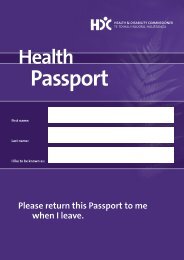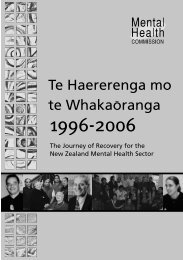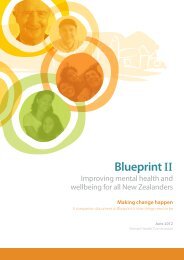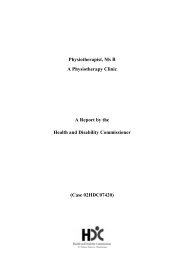09HDC01565 - Health and Disability Commissioner
09HDC01565 - Health and Disability Commissioner
09HDC01565 - Health and Disability Commissioner
You also want an ePaper? Increase the reach of your titles
YUMPU automatically turns print PDFs into web optimized ePapers that Google loves.
<strong>Health</strong> <strong>and</strong> <strong>Disability</strong> <strong>Commissioner</strong><br />
Additional information from RN Ms K<br />
142. RN Ms K is a senior registered nurse, who had worked on the ward since 2006. She<br />
has a postgraduate qualification in neuroscience nursing, ten years‘ postgraduate<br />
experience in nursing in the neurosciences <strong>and</strong> two years‘ experience in mixed<br />
general medical nursing.<br />
143. RN Ms K told HDC that she felt confident in relying on RN Ms J‘s report that there<br />
was no cause for concern in relation to Mr A <strong>and</strong> that he had been stable all night. She<br />
notes that by this time it had been 18 hours since his surgery. With regard to the<br />
prioritisation of patients, she states that the patient she needed to prioritise was the<br />
patient who had returned most recently from surgery, <strong>and</strong> who was showing obvious<br />
signs of being in pain on waking.<br />
144. RN Ms K states further that at h<strong>and</strong>over, ―you are relying on the h<strong>and</strong>over nurse to<br />
provide you with all vital information about the particular patient‖, <strong>and</strong> that this<br />
reliance is ―very much an act of trust‖.<br />
145. RN Ms K has also been represented by Mr P, <strong>and</strong> the advice of his nursing expert, Ms<br />
Pirret, is noted on this matter also. Ms Pirret states that she has no criticism in relation<br />
to RN Ms K‘s prioritisation of patients. Ms Pirret considers that with the information<br />
RN Ms K had, she had no reason to be concerned about Mr A <strong>and</strong> to assess him<br />
earlier. Accordingly, Mr P submits that RN Ms K‘s actions at this time were entirely<br />
reasonable.<br />
146. RN Ms K notes that when she found Mr A, he was ―extremely cold‖. She does not<br />
consider that he would have been this cold had he died while she was in the SCU,<br />
especially as he was covered with a sheet <strong>and</strong> at least one blanket.<br />
147. RN Ms K notes that since these events she:<br />
asks for specific figures when discussing a patient‘s vital signs at h<strong>and</strong>over;<br />
checks all patients at the start of shift, before recording individual observations;<br />
always makes sure that curtains are not drawn for lengthy periods of time, <strong>and</strong><br />
raises this issue in ward meetings if she notices this happening;<br />
raises in ward meetings any failures she observes of documentation of the<br />
respiratory rate;<br />
conducts <strong>and</strong> receives h<strong>and</strong>over for all SCU patients.<br />
Responses to provisional findings<br />
148. A number of points raised in the responses to my provisional findings have been<br />
incorporated above. The following submissions are also noted.<br />
CDHB<br />
149. CDHB notes that, subject to some specific comments, it accepts the finding that it<br />
breached the Code. However, it considers the adverse criticism of the individual staff<br />
should be reconsidered.<br />
5 September 2012 26<br />
Names have been removed (except Canterbury DHB <strong>and</strong> the experts who advised on this case) to<br />
protect privacy. Identifying letters are assigned in alphabetical order <strong>and</strong> bear no relationship to the<br />
person’s actual name.



